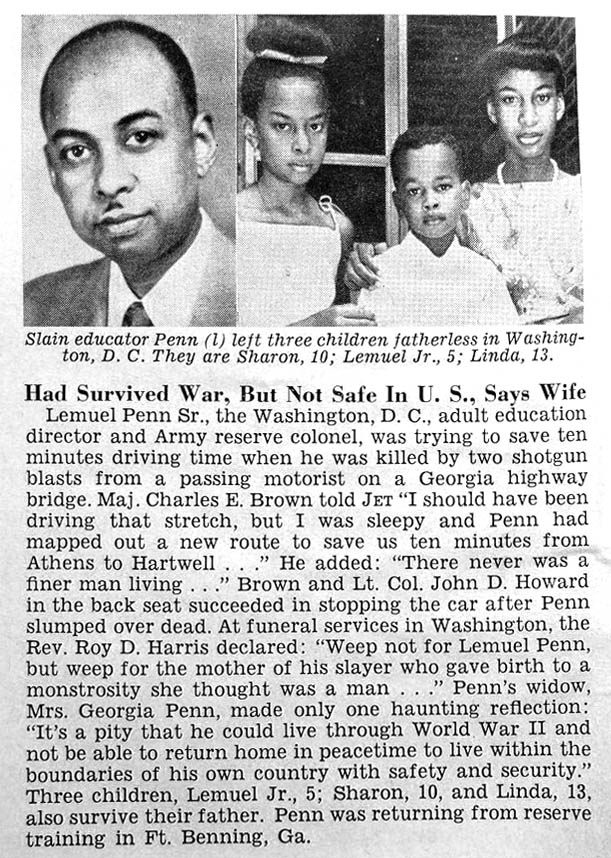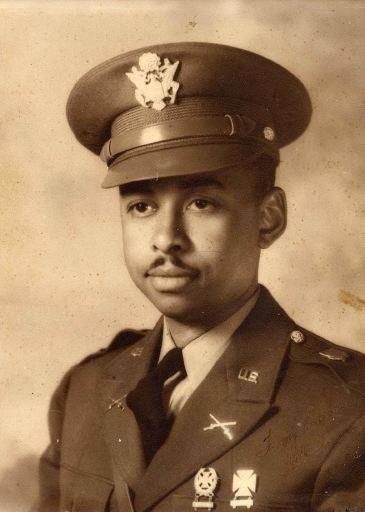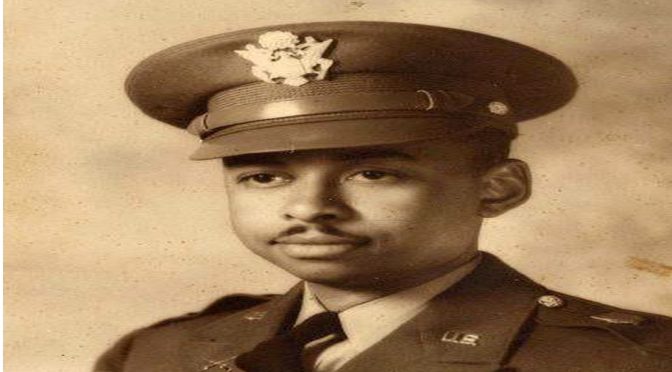Lemuel Augustus Penn (September 19, 1915 – July 11, 1964) was the Assistant Superintendent of Washington, D.C. public schools, a decorated veteran of World War II, the father of two daughters Linda, 13, Sharon, 11, one son Lemuel Jr., 5. and a Lieutenant Colonel in the United States Army Reserve, who was murdered by members of the Ku Klux Klan, nine days after passage of the Civil Rights Act of 1964.

Lemuel Penn joined the Army Reserve from Howard University and served as an officer in World War II in New Guinea and the Philippines, earning a Bronze Star. Penn was driving home, together with two other black Reserve officers, Major Charles E. Brown and Lieutenant Colonel John D. Howard, had just completed reserve training at Fort Benning, Georgia, and were driving home to Washington, D.C. The veterans had been spotted in Athens by local Ku Klux Klan members who followed them to a nearby bridge and shot at the car, killing Penn at the age of 48.

Their Chevrolet Biscayne was spotted by three white members of the United Klans of America – James Lackey, Cecil Myers, and Howard Sims – who noted its D.C plates. Howard Sims – one of the killers – then said "That must be one of President Johnson's boys", evidently motivated by racial hatred. The Klansmen followed the car with their Chevy II with Sims saying "I'm going to kill me a nigger".
Penn was shot to death on a Broad River bridge on the Georgia State Route 172 in Madison County, Georgia, near Colbert, twenty-two miles north of the city of Athens. Just before the highway reaches the Broad River, the Klansmen's Chevy II pulled alongside the Biscayne. The Klansman, Cecil Myers, raised a shotgun and fired. From the back seat, Howard Sims, also a member of the Ku Klux Klan, did the same.
After authorities arrived at the scene, rural lawmen poking flashlights into the car and shined them on Penn’s body, lying on the floorboard. “What’s been goin’ on here?” one officer drawled suspiciously at Brown and Howard. Then came the long hours of questioning, by local officials first, then state officials, and finally federal officials. There seemed to be a tone in the questioning that somehow Penn, Brown, and Howard had caused trouble, and that this was their retribution.
President Lyndon B. Johnson pledged the full resources of the Federal Bureau of Investigation (FBI) toward solving the murder. Over the course of the next several weeks, FBI agents combed for clues in and around Athens, gathering ample evidence of criminal activity conducted by local Klan members. After weeks of investigation, state prosecutors brought first-degree murder charges against two local white men, Cecil Myers and Joseph Howard Sims. Despite considerable evidence indicating their guilt, an all-white jury in Madison County acquitted both men on September 4, 1964.

Slightly more than a year later, Penn’s wife Georgia died at the age of forty-nine. Friends said it was from the grief after her husband’s death.
An army caisson, drawn by six grays, approached the Arlington National Cemetery gravesite to the strains of “Onward Christian Soldiers,” played by the army band. The caisson was the same one that had carried President John E Kennedy’s body to his grave seven months earlier. The music changed to “Abide With Me ” as the casket was lifted over the grave.

Penn's murder was the basis of the Supreme Court case United States v. Guest, 383 US 745 (1966), in which the Court affirmed the ability of the government to apply criminal charges to private conspirators, who with assistance from a state official, deprive a person of rights secured by the Fourteenth Amendment of the United States Constitution.
Federal prosecutors eventually charged both for violating Penn's civil rights under the Civil Rights Act of 1964. On June 27, 1966, criminal proceedings began against Sims, Myers, Lackey, and three other local Klansmen, Herbert Guest, Denver Phillips, and George Hampton Turner. Two weeks later, Sims and Myers were found guilty of conspiracy charges by a federal district court jury; their four co-defendants, however, were acquitted. Sims and Myers were sentenced to ten years each and served about six in federal prison. Howard Sims was killed with a shotgun in 1981 at age 58. James Lackey died at age 66 in 2002. Cecil Myers died in 2018 at the age of 79.

The historical marker erected by the Georgia Historical Society, the Lemuel Penn Memorial Committee, and Colbert Grove Baptist Church at Georgia Highway 172 and Broad River Bridge on the Madison/Elbert County Border states:
On the night of July 11, 1964 three African-American World War II veterans returning home following training at Ft. Benning, Georgia were noticed in Athens by local members of the Ku Klux Klan. The officers were followed to the nearby Broad River Bridge where their pursuers fired into the vehicle, killing Lt. Col. Lemuel Penn. When a local jury failed to convict the suspects of murder, the federal government successfully prosecuted the men for violations under the new Civil Rights Act of 1964, passed just nine days before Penn's murder. The case was instrumental in the creation of a Justice Department task force whose work culminated in the Civil Rights Act of 1968.
The Ballad of Lemuel Penn by Edward David Anderson


